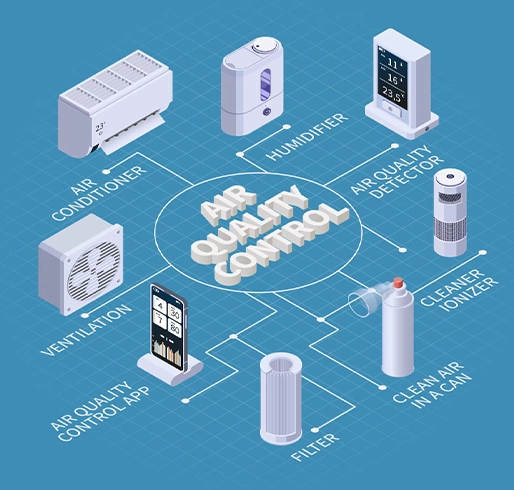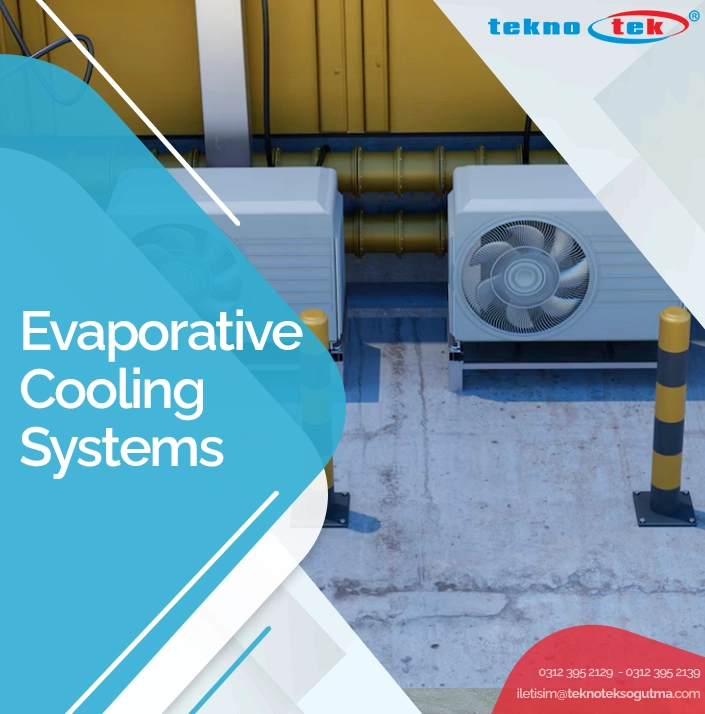Evaporative cooling systems are among the most efficient cooling solutions. These systems reduce heat in the air through evaporation, providing eco-friendliness and energy efficiency. They lower ambient temperature by evaporating water, offering effective cooling especially in hot and dry climates. Consuming less energy, these systems do not emit environmentally harmful gases.
Evaporative cooling systems are a highly advantageous choice in terms of operating costs. These systems feature filtration and air circulation capabilities. Therefore, they provide cleaner air while also maintaining the humidity balance of the environment. Common areas of use include production facilities and warehouses. Standing out with their economical, eco-friendly, and silent operation, these systems hold an important place among sustainable cooling solutions.
The advantages of evaporative cooling systems include:
What is Evaporative Cooling?
Evaporative cooling is a type of efficient cooling system that reduces heat in the air through water evaporation. This system is preferred for its environmentally friendly approach and energy efficiency. It operates at high efficiency in hot and dry climates and lowers the ambient temperature. One of the main advantages of evaporative coolers is their lower cost compared to traditional air conditioning systems, thanks to their low energy consumption.
Evaporative coolers utilize the evaporation energy of water during heat exchange. In this process, heat is drawn from the air, resulting in a cooler environment. Commonly used in industrial facilities, warehouses, greenhouses, and large enclosed spaces, these systems offer eco-friendly and budget-conscious solutions with their low operating costs.
The general features of evaporative cooling systems include:
Compared to traditional cooling systems, evaporative systems present both an eco-friendly and economical alternative, making them increasingly preferred in both residential and industrial settings.

Given today’s rising energy costs and environmental concerns, these systems offer advantages in both sustainability and affordability. Used to meet the climate control needs of large spaces, they represent both a practical and long-term investment.
How Does a Swamp Cooler Work?
The working principle of evaporative cooling is based on the process of cooling air by bringing it into contact with water. In this system, hot air is drawn from the outside and passed through wetted surfaces called pads or media. During this process, the air cools as the water evaporates in response to the ambient heat load, significantly reducing the indoor temperature. These systems are entirely eco-friendly and use CFC-free technologies, making them harmless to the environment.
Evaporative coolers are highly effective cooling systems for large areas. Evaporation is managed through humidity-controlled filters, which also capture dust and airborne particles, resulting in cleaner indoor air. Due to their working principle, their efficiency may decrease in high-humidity environments, but they perform exceptionally well in hot and arid climates.
The installation and maintenance of evaporative coolers are relatively simple. These devices are typically available in fixed or portable models. The air cooling process involves electric fans and a water circulation system that keeps the cooling pads continuously moist. As a result, not only cool but also fresh and filtered air is delivered.
When choosing a cooling system, factors such as space size, climate conditions, and humidity levels should be considered. One of the additional advantages of air coolers is their significantly lower operating costs compared to conventional air conditioning systems.
Evaporative cooling systems are recognized as one of the most eco-friendly and cost-effective climate control solutions of the future.
For more information about evaporative cooling systems, you can contact Teknotek.

